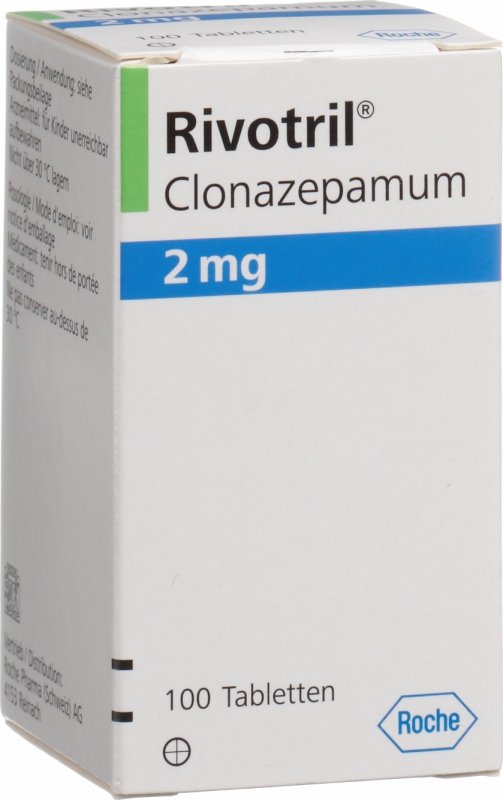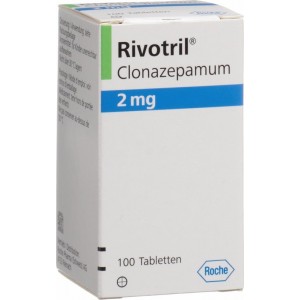Shipped From: USA
Shipping Method: USPS (Trackable)
Delivery Time: 3 To 5 Days
Availability:
Buy Klonopin Online without Prescription Mail Delivery
What is Klonopin / Clonazepam and when is it used?
Klonopin / Clonazepam is a drug of the benzodiazepine class, with marked spasmolytic and anticonvulsant properties. It is therefore prescribed by the doctor for the treatment and prevention of epileptic seizures in adults and children.

Klonopin / Clonazepam should only be used on prescriptions.
What must also be taken into account during treatment?
During treatment with Klonopin / Clonazepam, you cannot drink alcoholic beverages, as these can change the course of treatment and the outcome of the therapy.
In the first few days of treatment, you must not drive or use machines. Your doctor will then decide on this.
How to use Klonopin / Clonazepam?
Klonopin / Clonazepam should be taken according to the doctor's prescription.
It is up to your doctor to determine the dose of Klonopin / Clonazepam indicated for you and the duration of therapy.
Do not change the prescribed dosage on your own initiative. If you think that the action of the medicine is too weak or too strong, talk to your doctor or pharmacist.
To avoid side effects at the start of therapy, the doctor will gradually increase the daily dose until the required maintenance dose is reached.
Generally the dosage for adults is as follows: starting dose: 1.5 mg / day (one light orange 0.5 mg tablet 3 times a day). Within the first three weeks of treatment, your doctor will increase the dose to 4-8 mg / day (in rare cases up to 20 mg / day). The total daily dose can be taken in a single dose in the evening. However, the doctor may consider it appropriate to divide the daily dose into several administrations during the day. In elderly patients, the physician should prescribe the lowest possible dose and dose escalation should be done with caution. To facilitate dosage adjustment, Klonopin / Clonazepam 0.5 mg tablets can be halved. Klonopin / Clonazepam 2 mg tablets can be halved or divided into four parts to facilitate dosage adjustment.
Klonopin / Clonazepam treatment should never be stopped abruptly.
With regard to epileptic children and infants, the doctor will in any case decide whether Klonopin / Clonazepam therapy is suitable. For children and infants, 0.5 mg light orange tablets or drops are indicated.
Take Klonopin / Clonazepam tablets with a glass of water or a non-alcoholic drink.
Never drip Klonopin / Clonazepam drops directly into the mouth. After each opening of the bottle, make sure that the dropper is firmly inserted into the neck of the bottle. The drops are administered with a spoon, mixed with water, tea or orange juice.
What side effects can Klonopin / Clonazepam have?
The following side effects may occur when taking Klonopin / Clonazepam:
Especially at the beginning of therapy, you may feel tired, sleepy or unsure when walking due to muscle weakness. These side effects usually disappear during the course of treatment.
Other side effects, such as breathing problems, bladder problems, visual disturbances, movement disturbances, confusion should be reported to the doctor immediately. Mood and affective fluctuations and disorientation have been observed during treatment with Klonopin / Clonazepam.
Depressions may appear due to treatment with Klonopin / Clonazepam, but they may also be related to the underlying disease.
In addition, behavioral changes such as restlessness, irritability, excitability, aggression, nervousness, hostility, anxiety states, sleep disturbances, delusional imaginations, anger, nightmares, abnormal dreams, hallucinations, psychic disorders with loss of reference to reality, hyperactivity can occur. , inappropriate behavior, and other behavioral side effects.
In such cases, it is advisable to consult your doctor about Klonopin / Clonazepam therapy and possibly stop it. These so-called "paradoxical reactions" appear more frequently in children, adolescents and the elderly than in adults.
Changes in libido may rarely occur.
Treatment with benzodiazepines, of which Klonopin / Clonazepam is also a part, can lead to physical and psychological dependence. Therefore, if Klonopin / Clonazepam treatment is to be discontinued, the procedure should be agreed with the treating physician.
Salivary secretion may increase in infants and young children. In elderly patients it may increase the risk of falling.
In case of hypersensitivity reactions (e.g. skin reactions), consult your doctor immediately.
If you notice any side effects not described in this leaflet you should inform your doctor or pharmacist.
When is caution required in the administration of Clonazepam?
If you suffer from kidney or liver disease or severe chronic respiratory disease, please speak to your doctor who will take special care when dosing Clonazepam. If, in the past, you have suffered from depression or had thoughts about suicide, it is recommended that you take Clonazepam only under strict medical supervision. Clonazepam should not be prescribed by your doctor as a first treatment. If you suffer from severe liver dysfunction, it is not recommended to take Clonazepam.
Tell your doctor or pharmacist just in case
- suffer from other diseases,
- suffer from allergies,
- if you are / have been dependent on alcohol, drugs or medications or
- take or apply other medications (even if purchased on your own!)!
Other antiepileptic drugs can interact with Clonazepam, modifying its effect and more side effects may occur. In addition, some decrease in effectiveness may occur during treatment with Clonazepam.
Sleeping pills, analgesics and antidepressants can modify the effect of Clonazepam. This also applies to muscle relaxant drugs.
Do not take these medicines without your doctor's consent.
During treatment with Clonazepam you cannot drink alcoholic drinks, because alcohol interacts with Clonazepam and can cause unexpected side effects.
This drug can reduce the ability to react, the ability to drive vehicles and the ability to use tools or machines! The ability to react is slowed during treatment with Clonazepam. At least for the first few days of treatment, one should therefore refrain from driving vehicles or using dangerous machines. The doctor will then decide on this. If you are known to suffer from an intolerance to certain sugars, take Clonazepam tablets only after consulting your doctor.
Danger of drug dependence
Clonazepam - like all benzodiazepine-based drugs - can be addictive, especially when it is taken continuously and for a long period of time (in some cases it takes just a few weeks). As a result, abrupt discontinuation of treatment may lead to withdrawal symptoms such as restlessness, anxiety, insomnia, difficulty concentrating, diarrhea, headache, mood changes and diaphoresis (sweating). These symptoms usually disappear within 2-3 weeks.
To minimize the risk of addiction, stick to the following recommendations:
- only take Clonazepam on prescription.
- under no circumstances increase the dose that your doctor has prescribed for you.
- tell your doctor if you want to stop the treatment.
- Your doctor will periodically decide whether the treatment should be continued.
Long-term administration (usually more than four weeks) should only take place under strict medical supervision.
Can Clonazepam be given during pregnancy or breastfeeding?
Clonazepam is contraindicated in pregnancy and lactation, unless explicitly prescribed by a doctor.
Contact your doctor immediately if you are planning a pregnancy or if you think you are pregnant. Do not stop treatment on your own initiative, as this could lead to an aggravation of the disease.
What does Klonopin/ Clonazepam contain?
1 ml of drops contains 2.5 mg of clonazepam (25 drops correspond to 1 ml). Auxiliary substances: dyes: bright blue, aromatic additives, saccharin (sweetener).
1 light orange tablet contains 0.5 mg of clonazepam as well as lactose and other auxiliary substances.
1 white tablet contains 2 mg of clonazepam as well as lactose and other auxiliary substances.



